Analysis of Unilever's Strategic Management
VerifiedAdded on 2020/10/22
|11
|2981
|251
AI Summary
The assignment requires analysis of Unilever's strategic management, including changes in organizational structure and key personnel appointments. It also involves understanding the reasons behind rejecting the Kraft Heinz bid offer. The report aims to establish the importance of reviewing company brands for ongoing performance improvement.
Contribute Materials
Your contribution can guide someone’s learning journey. Share your
documents today.
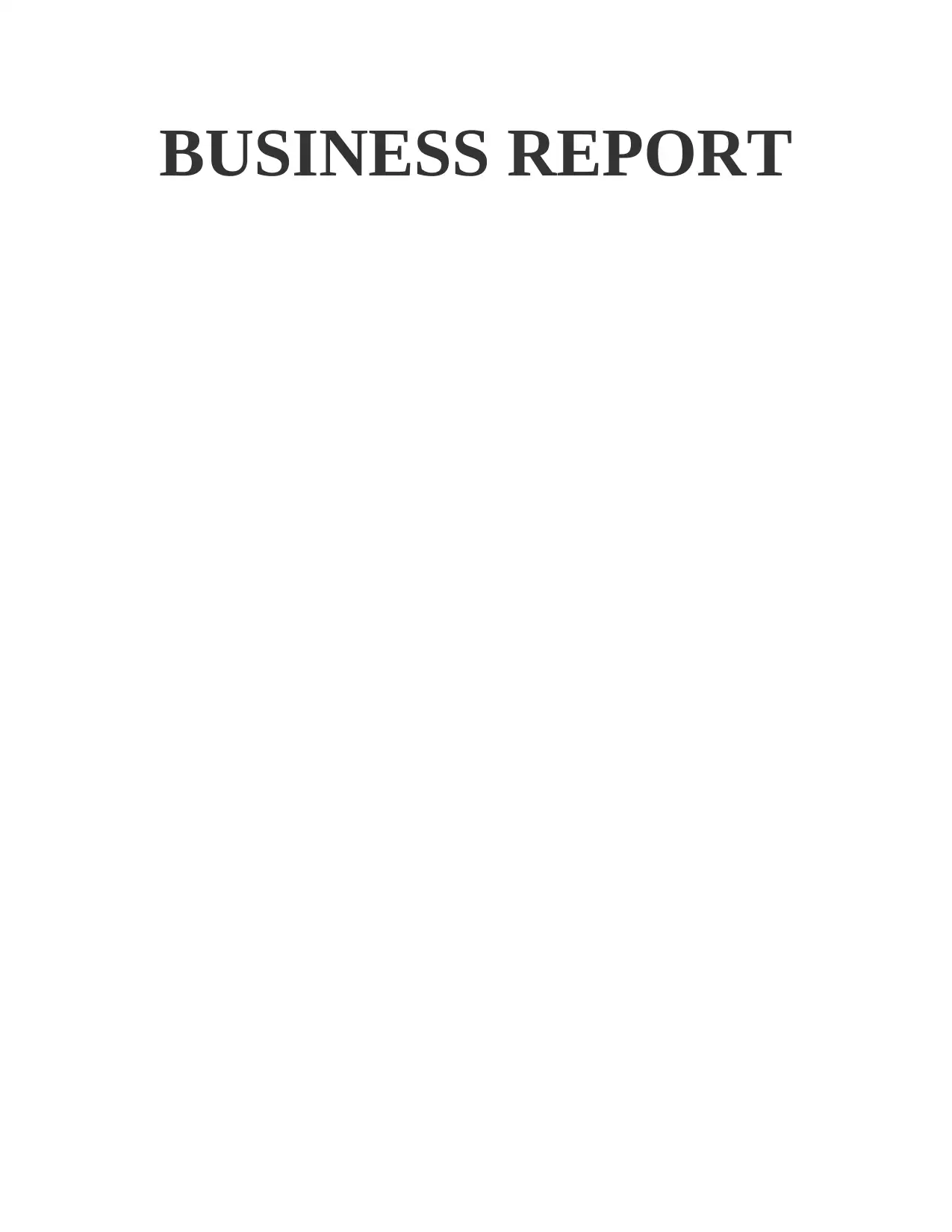
BUSINESS REPORT
Secure Best Marks with AI Grader
Need help grading? Try our AI Grader for instant feedback on your assignments.
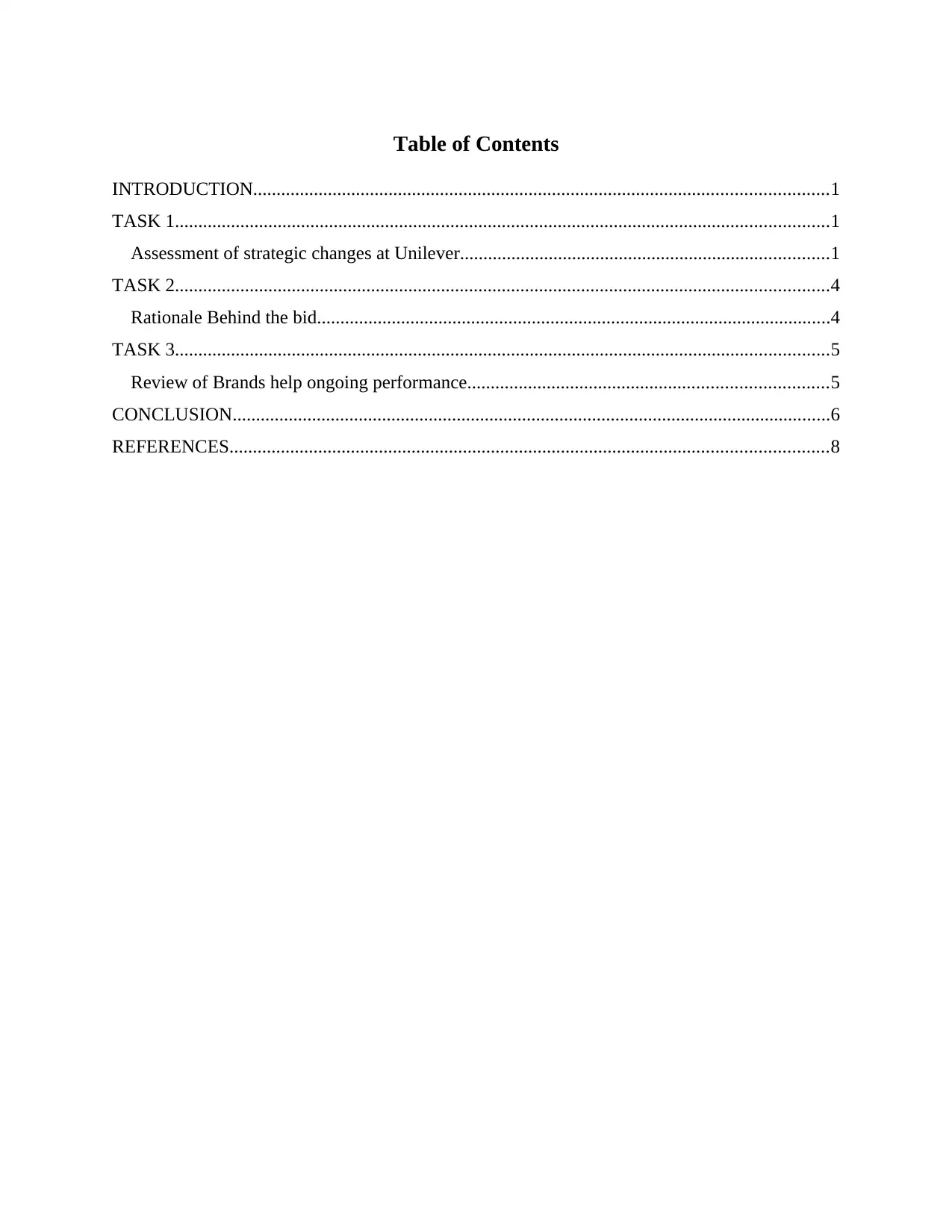
Table of Contents
INTRODUCTION...........................................................................................................................1
TASK 1............................................................................................................................................1
Assessment of strategic changes at Unilever...............................................................................1
TASK 2............................................................................................................................................4
Rationale Behind the bid..............................................................................................................4
TASK 3............................................................................................................................................5
Review of Brands help ongoing performance.............................................................................5
CONCLUSION................................................................................................................................6
REFERENCES................................................................................................................................8
INTRODUCTION...........................................................................................................................1
TASK 1............................................................................................................................................1
Assessment of strategic changes at Unilever...............................................................................1
TASK 2............................................................................................................................................4
Rationale Behind the bid..............................................................................................................4
TASK 3............................................................................................................................................5
Review of Brands help ongoing performance.............................................................................5
CONCLUSION................................................................................................................................6
REFERENCES................................................................................................................................8

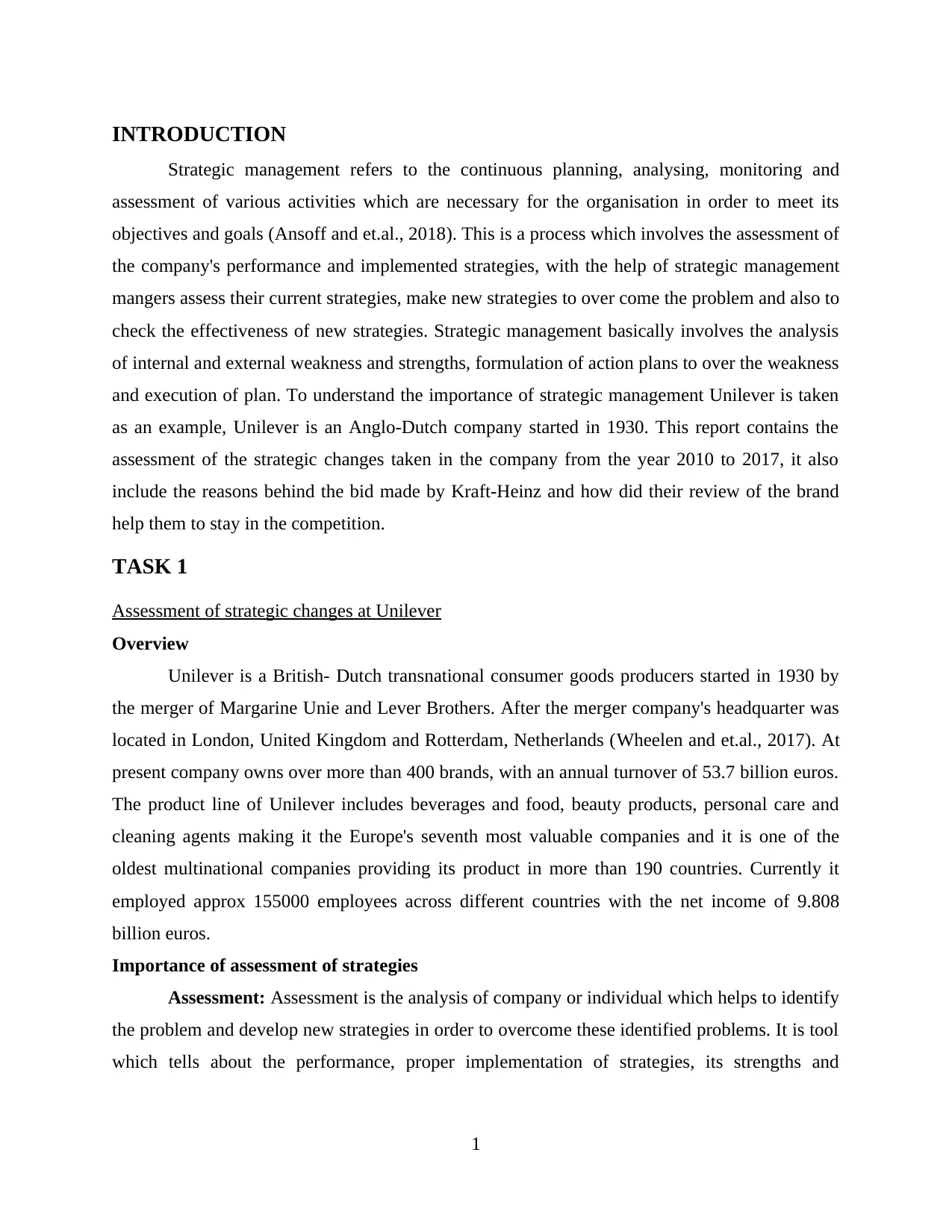
INTRODUCTION
Strategic management refers to the continuous planning, analysing, monitoring and
assessment of various activities which are necessary for the organisation in order to meet its
objectives and goals (Ansoff and et.al., 2018). This is a process which involves the assessment of
the company's performance and implemented strategies, with the help of strategic management
mangers assess their current strategies, make new strategies to over come the problem and also to
check the effectiveness of new strategies. Strategic management basically involves the analysis
of internal and external weakness and strengths, formulation of action plans to over the weakness
and execution of plan. To understand the importance of strategic management Unilever is taken
as an example, Unilever is an Anglo-Dutch company started in 1930. This report contains the
assessment of the strategic changes taken in the company from the year 2010 to 2017, it also
include the reasons behind the bid made by Kraft-Heinz and how did their review of the brand
help them to stay in the competition.
TASK 1
Assessment of strategic changes at Unilever
Overview
Unilever is a British- Dutch transnational consumer goods producers started in 1930 by
the merger of Margarine Unie and Lever Brothers. After the merger company's headquarter was
located in London, United Kingdom and Rotterdam, Netherlands (Wheelen and et.al., 2017). At
present company owns over more than 400 brands, with an annual turnover of 53.7 billion euros.
The product line of Unilever includes beverages and food, beauty products, personal care and
cleaning agents making it the Europe's seventh most valuable companies and it is one of the
oldest multinational companies providing its product in more than 190 countries. Currently it
employed approx 155000 employees across different countries with the net income of 9.808
billion euros.
Importance of assessment of strategies
Assessment: Assessment is the analysis of company or individual which helps to identify
the problem and develop new strategies in order to overcome these identified problems. It is tool
which tells about the performance, proper implementation of strategies, its strengths and
1
Strategic management refers to the continuous planning, analysing, monitoring and
assessment of various activities which are necessary for the organisation in order to meet its
objectives and goals (Ansoff and et.al., 2018). This is a process which involves the assessment of
the company's performance and implemented strategies, with the help of strategic management
mangers assess their current strategies, make new strategies to over come the problem and also to
check the effectiveness of new strategies. Strategic management basically involves the analysis
of internal and external weakness and strengths, formulation of action plans to over the weakness
and execution of plan. To understand the importance of strategic management Unilever is taken
as an example, Unilever is an Anglo-Dutch company started in 1930. This report contains the
assessment of the strategic changes taken in the company from the year 2010 to 2017, it also
include the reasons behind the bid made by Kraft-Heinz and how did their review of the brand
help them to stay in the competition.
TASK 1
Assessment of strategic changes at Unilever
Overview
Unilever is a British- Dutch transnational consumer goods producers started in 1930 by
the merger of Margarine Unie and Lever Brothers. After the merger company's headquarter was
located in London, United Kingdom and Rotterdam, Netherlands (Wheelen and et.al., 2017). At
present company owns over more than 400 brands, with an annual turnover of 53.7 billion euros.
The product line of Unilever includes beverages and food, beauty products, personal care and
cleaning agents making it the Europe's seventh most valuable companies and it is one of the
oldest multinational companies providing its product in more than 190 countries. Currently it
employed approx 155000 employees across different countries with the net income of 9.808
billion euros.
Importance of assessment of strategies
Assessment: Assessment is the analysis of company or individual which helps to identify
the problem and develop new strategies in order to overcome these identified problems. It is tool
which tells about the performance, proper implementation of strategies, its strengths and
1
Secure Best Marks with AI Grader
Need help grading? Try our AI Grader for instant feedback on your assignments.
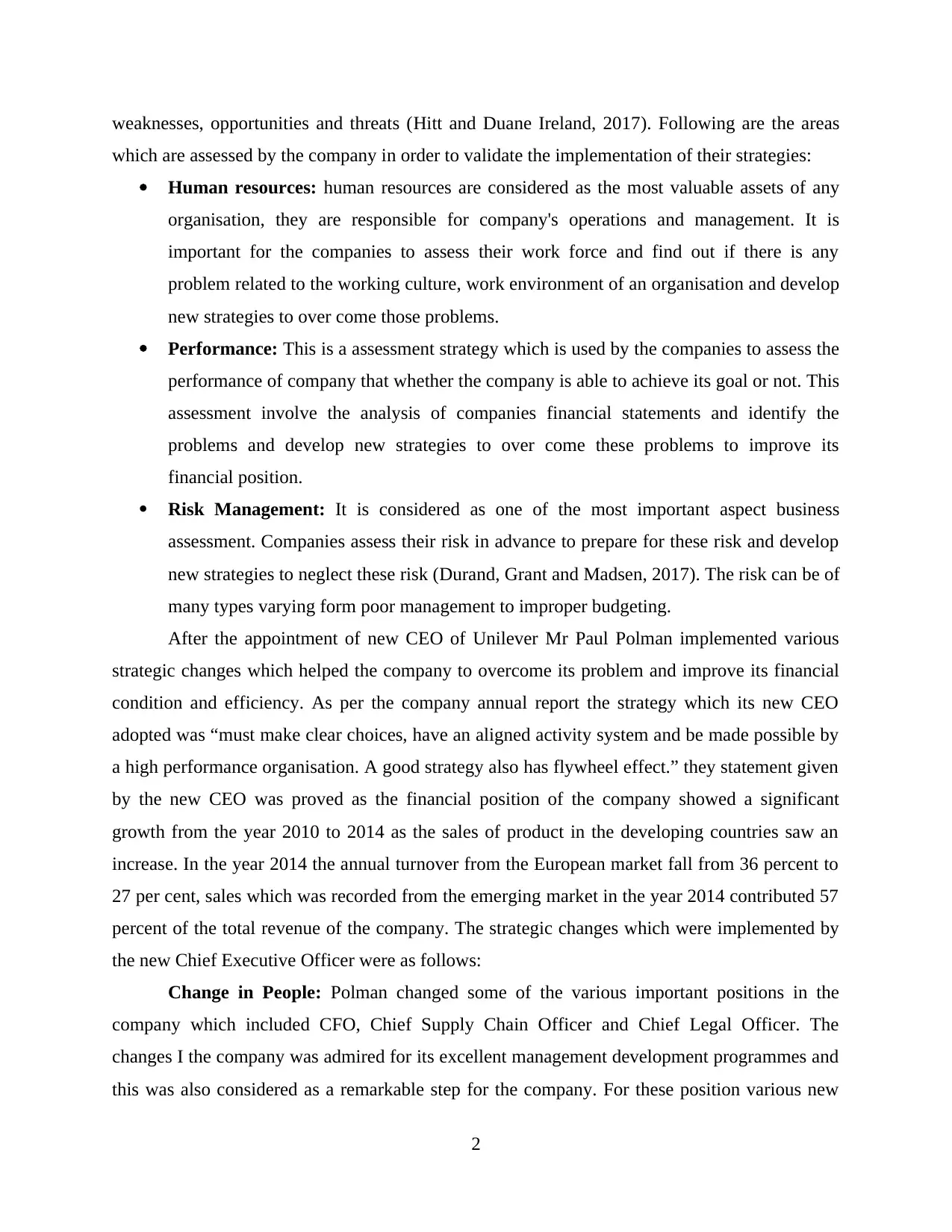
weaknesses, opportunities and threats (Hitt and Duane Ireland, 2017). Following are the areas
which are assessed by the company in order to validate the implementation of their strategies:
Human resources: human resources are considered as the most valuable assets of any
organisation, they are responsible for company's operations and management. It is
important for the companies to assess their work force and find out if there is any
problem related to the working culture, work environment of an organisation and develop
new strategies to over come those problems.
Performance: This is a assessment strategy which is used by the companies to assess the
performance of company that whether the company is able to achieve its goal or not. This
assessment involve the analysis of companies financial statements and identify the
problems and develop new strategies to over come these problems to improve its
financial position.
Risk Management: It is considered as one of the most important aspect business
assessment. Companies assess their risk in advance to prepare for these risk and develop
new strategies to neglect these risk (Durand, Grant and Madsen, 2017). The risk can be of
many types varying form poor management to improper budgeting.
After the appointment of new CEO of Unilever Mr Paul Polman implemented various
strategic changes which helped the company to overcome its problem and improve its financial
condition and efficiency. As per the company annual report the strategy which its new CEO
adopted was “must make clear choices, have an aligned activity system and be made possible by
a high performance organisation. A good strategy also has flywheel effect.” they statement given
by the new CEO was proved as the financial position of the company showed a significant
growth from the year 2010 to 2014 as the sales of product in the developing countries saw an
increase. In the year 2014 the annual turnover from the European market fall from 36 percent to
27 per cent, sales which was recorded from the emerging market in the year 2014 contributed 57
percent of the total revenue of the company. The strategic changes which were implemented by
the new Chief Executive Officer were as follows:
Change in People: Polman changed some of the various important positions in the
company which included CFO, Chief Supply Chain Officer and Chief Legal Officer. The
changes I the company was admired for its excellent management development programmes and
this was also considered as a remarkable step for the company. For these position various new
2
which are assessed by the company in order to validate the implementation of their strategies:
Human resources: human resources are considered as the most valuable assets of any
organisation, they are responsible for company's operations and management. It is
important for the companies to assess their work force and find out if there is any
problem related to the working culture, work environment of an organisation and develop
new strategies to over come those problems.
Performance: This is a assessment strategy which is used by the companies to assess the
performance of company that whether the company is able to achieve its goal or not. This
assessment involve the analysis of companies financial statements and identify the
problems and develop new strategies to over come these problems to improve its
financial position.
Risk Management: It is considered as one of the most important aspect business
assessment. Companies assess their risk in advance to prepare for these risk and develop
new strategies to neglect these risk (Durand, Grant and Madsen, 2017). The risk can be of
many types varying form poor management to improper budgeting.
After the appointment of new CEO of Unilever Mr Paul Polman implemented various
strategic changes which helped the company to overcome its problem and improve its financial
condition and efficiency. As per the company annual report the strategy which its new CEO
adopted was “must make clear choices, have an aligned activity system and be made possible by
a high performance organisation. A good strategy also has flywheel effect.” they statement given
by the new CEO was proved as the financial position of the company showed a significant
growth from the year 2010 to 2014 as the sales of product in the developing countries saw an
increase. In the year 2014 the annual turnover from the European market fall from 36 percent to
27 per cent, sales which was recorded from the emerging market in the year 2014 contributed 57
percent of the total revenue of the company. The strategic changes which were implemented by
the new Chief Executive Officer were as follows:
Change in People: Polman changed some of the various important positions in the
company which included CFO, Chief Supply Chain Officer and Chief Legal Officer. The
changes I the company was admired for its excellent management development programmes and
this was also considered as a remarkable step for the company. For these position various new
2
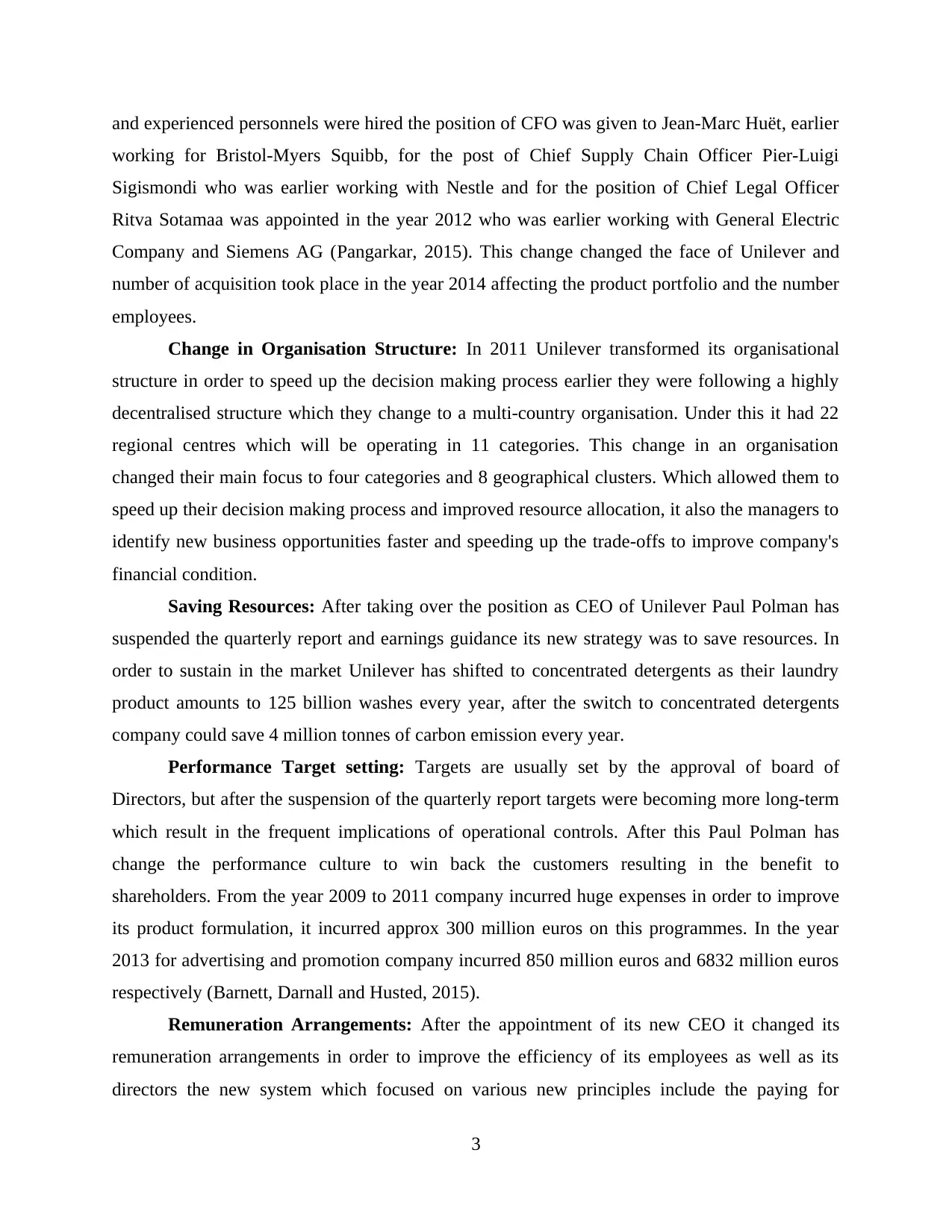
and experienced personnels were hired the position of CFO was given to Jean-Marc Huët, earlier
working for Bristol-Myers Squibb, for the post of Chief Supply Chain Officer Pier-Luigi
Sigismondi who was earlier working with Nestle and for the position of Chief Legal Officer
Ritva Sotamaa was appointed in the year 2012 who was earlier working with General Electric
Company and Siemens AG (Pangarkar, 2015). This change changed the face of Unilever and
number of acquisition took place in the year 2014 affecting the product portfolio and the number
employees.
Change in Organisation Structure: In 2011 Unilever transformed its organisational
structure in order to speed up the decision making process earlier they were following a highly
decentralised structure which they change to a multi-country organisation. Under this it had 22
regional centres which will be operating in 11 categories. This change in an organisation
changed their main focus to four categories and 8 geographical clusters. Which allowed them to
speed up their decision making process and improved resource allocation, it also the managers to
identify new business opportunities faster and speeding up the trade-offs to improve company's
financial condition.
Saving Resources: After taking over the position as CEO of Unilever Paul Polman has
suspended the quarterly report and earnings guidance its new strategy was to save resources. In
order to sustain in the market Unilever has shifted to concentrated detergents as their laundry
product amounts to 125 billion washes every year, after the switch to concentrated detergents
company could save 4 million tonnes of carbon emission every year.
Performance Target setting: Targets are usually set by the approval of board of
Directors, but after the suspension of the quarterly report targets were becoming more long-term
which result in the frequent implications of operational controls. After this Paul Polman has
change the performance culture to win back the customers resulting in the benefit to
shareholders. From the year 2009 to 2011 company incurred huge expenses in order to improve
its product formulation, it incurred approx 300 million euros on this programmes. In the year
2013 for advertising and promotion company incurred 850 million euros and 6832 million euros
respectively (Barnett, Darnall and Husted, 2015).
Remuneration Arrangements: After the appointment of its new CEO it changed its
remuneration arrangements in order to improve the efficiency of its employees as well as its
directors the new system which focused on various new principles include the paying for
3
working for Bristol-Myers Squibb, for the post of Chief Supply Chain Officer Pier-Luigi
Sigismondi who was earlier working with Nestle and for the position of Chief Legal Officer
Ritva Sotamaa was appointed in the year 2012 who was earlier working with General Electric
Company and Siemens AG (Pangarkar, 2015). This change changed the face of Unilever and
number of acquisition took place in the year 2014 affecting the product portfolio and the number
employees.
Change in Organisation Structure: In 2011 Unilever transformed its organisational
structure in order to speed up the decision making process earlier they were following a highly
decentralised structure which they change to a multi-country organisation. Under this it had 22
regional centres which will be operating in 11 categories. This change in an organisation
changed their main focus to four categories and 8 geographical clusters. Which allowed them to
speed up their decision making process and improved resource allocation, it also the managers to
identify new business opportunities faster and speeding up the trade-offs to improve company's
financial condition.
Saving Resources: After taking over the position as CEO of Unilever Paul Polman has
suspended the quarterly report and earnings guidance its new strategy was to save resources. In
order to sustain in the market Unilever has shifted to concentrated detergents as their laundry
product amounts to 125 billion washes every year, after the switch to concentrated detergents
company could save 4 million tonnes of carbon emission every year.
Performance Target setting: Targets are usually set by the approval of board of
Directors, but after the suspension of the quarterly report targets were becoming more long-term
which result in the frequent implications of operational controls. After this Paul Polman has
change the performance culture to win back the customers resulting in the benefit to
shareholders. From the year 2009 to 2011 company incurred huge expenses in order to improve
its product formulation, it incurred approx 300 million euros on this programmes. In the year
2013 for advertising and promotion company incurred 850 million euros and 6832 million euros
respectively (Barnett, Darnall and Husted, 2015).
Remuneration Arrangements: After the appointment of its new CEO it changed its
remuneration arrangements in order to improve the efficiency of its employees as well as its
directors the new system which focused on various new principles include the paying for
3
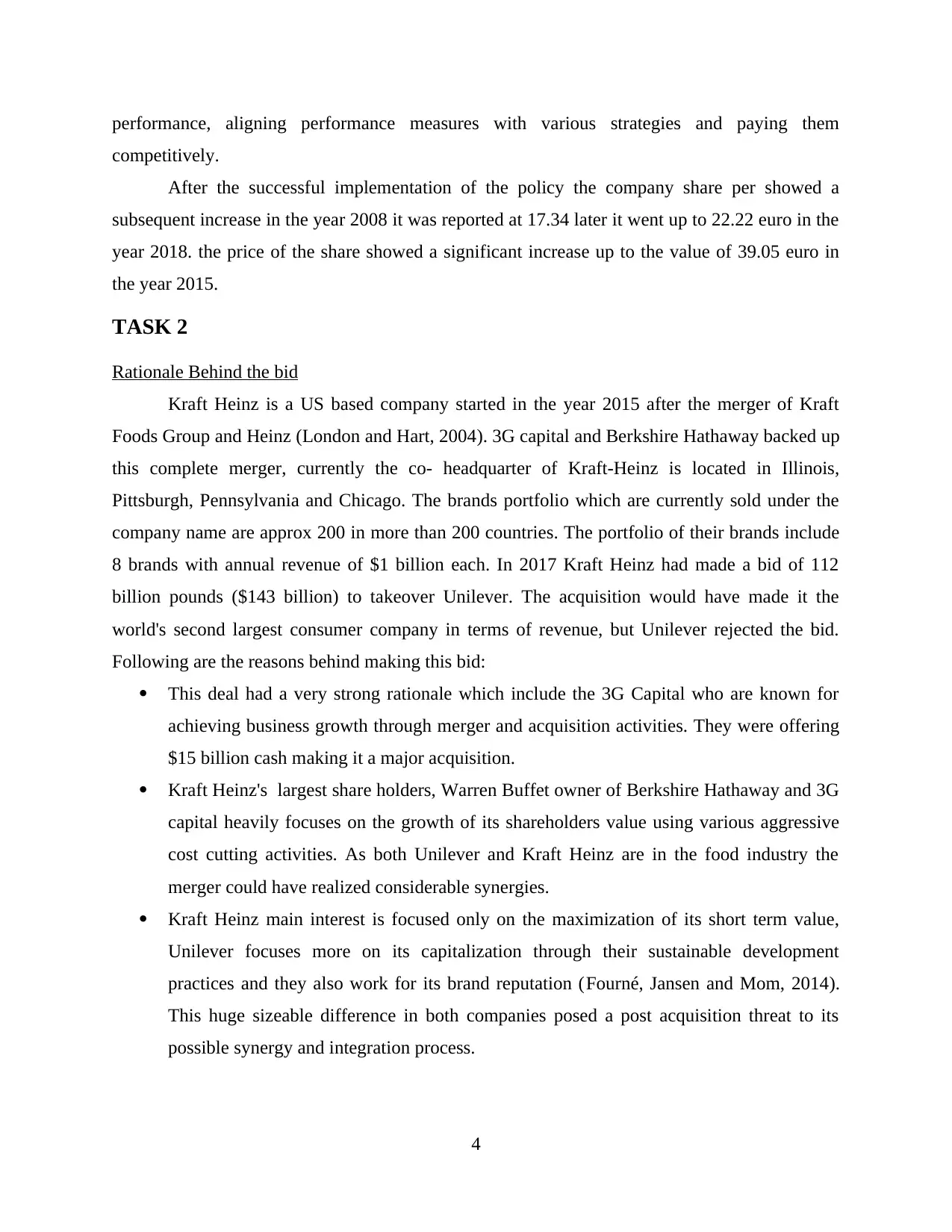
performance, aligning performance measures with various strategies and paying them
competitively.
After the successful implementation of the policy the company share per showed a
subsequent increase in the year 2008 it was reported at 17.34 later it went up to 22.22 euro in the
year 2018. the price of the share showed a significant increase up to the value of 39.05 euro in
the year 2015.
TASK 2
Rationale Behind the bid
Kraft Heinz is a US based company started in the year 2015 after the merger of Kraft
Foods Group and Heinz (London and Hart, 2004). 3G capital and Berkshire Hathaway backed up
this complete merger, currently the co- headquarter of Kraft-Heinz is located in Illinois,
Pittsburgh, Pennsylvania and Chicago. The brands portfolio which are currently sold under the
company name are approx 200 in more than 200 countries. The portfolio of their brands include
8 brands with annual revenue of $1 billion each. In 2017 Kraft Heinz had made a bid of 112
billion pounds ($143 billion) to takeover Unilever. The acquisition would have made it the
world's second largest consumer company in terms of revenue, but Unilever rejected the bid.
Following are the reasons behind making this bid:
This deal had a very strong rationale which include the 3G Capital who are known for
achieving business growth through merger and acquisition activities. They were offering
$15 billion cash making it a major acquisition.
Kraft Heinz's largest share holders, Warren Buffet owner of Berkshire Hathaway and 3G
capital heavily focuses on the growth of its shareholders value using various aggressive
cost cutting activities. As both Unilever and Kraft Heinz are in the food industry the
merger could have realized considerable synergies.
Kraft Heinz main interest is focused only on the maximization of its short term value,
Unilever focuses more on its capitalization through their sustainable development
practices and they also work for its brand reputation (Fourné, Jansen and Mom, 2014).
This huge sizeable difference in both companies posed a post acquisition threat to its
possible synergy and integration process.
4
competitively.
After the successful implementation of the policy the company share per showed a
subsequent increase in the year 2008 it was reported at 17.34 later it went up to 22.22 euro in the
year 2018. the price of the share showed a significant increase up to the value of 39.05 euro in
the year 2015.
TASK 2
Rationale Behind the bid
Kraft Heinz is a US based company started in the year 2015 after the merger of Kraft
Foods Group and Heinz (London and Hart, 2004). 3G capital and Berkshire Hathaway backed up
this complete merger, currently the co- headquarter of Kraft-Heinz is located in Illinois,
Pittsburgh, Pennsylvania and Chicago. The brands portfolio which are currently sold under the
company name are approx 200 in more than 200 countries. The portfolio of their brands include
8 brands with annual revenue of $1 billion each. In 2017 Kraft Heinz had made a bid of 112
billion pounds ($143 billion) to takeover Unilever. The acquisition would have made it the
world's second largest consumer company in terms of revenue, but Unilever rejected the bid.
Following are the reasons behind making this bid:
This deal had a very strong rationale which include the 3G Capital who are known for
achieving business growth through merger and acquisition activities. They were offering
$15 billion cash making it a major acquisition.
Kraft Heinz's largest share holders, Warren Buffet owner of Berkshire Hathaway and 3G
capital heavily focuses on the growth of its shareholders value using various aggressive
cost cutting activities. As both Unilever and Kraft Heinz are in the food industry the
merger could have realized considerable synergies.
Kraft Heinz main interest is focused only on the maximization of its short term value,
Unilever focuses more on its capitalization through their sustainable development
practices and they also work for its brand reputation (Fourné, Jansen and Mom, 2014).
This huge sizeable difference in both companies posed a post acquisition threat to its
possible synergy and integration process.
4
Paraphrase This Document
Need a fresh take? Get an instant paraphrase of this document with our AI Paraphraser
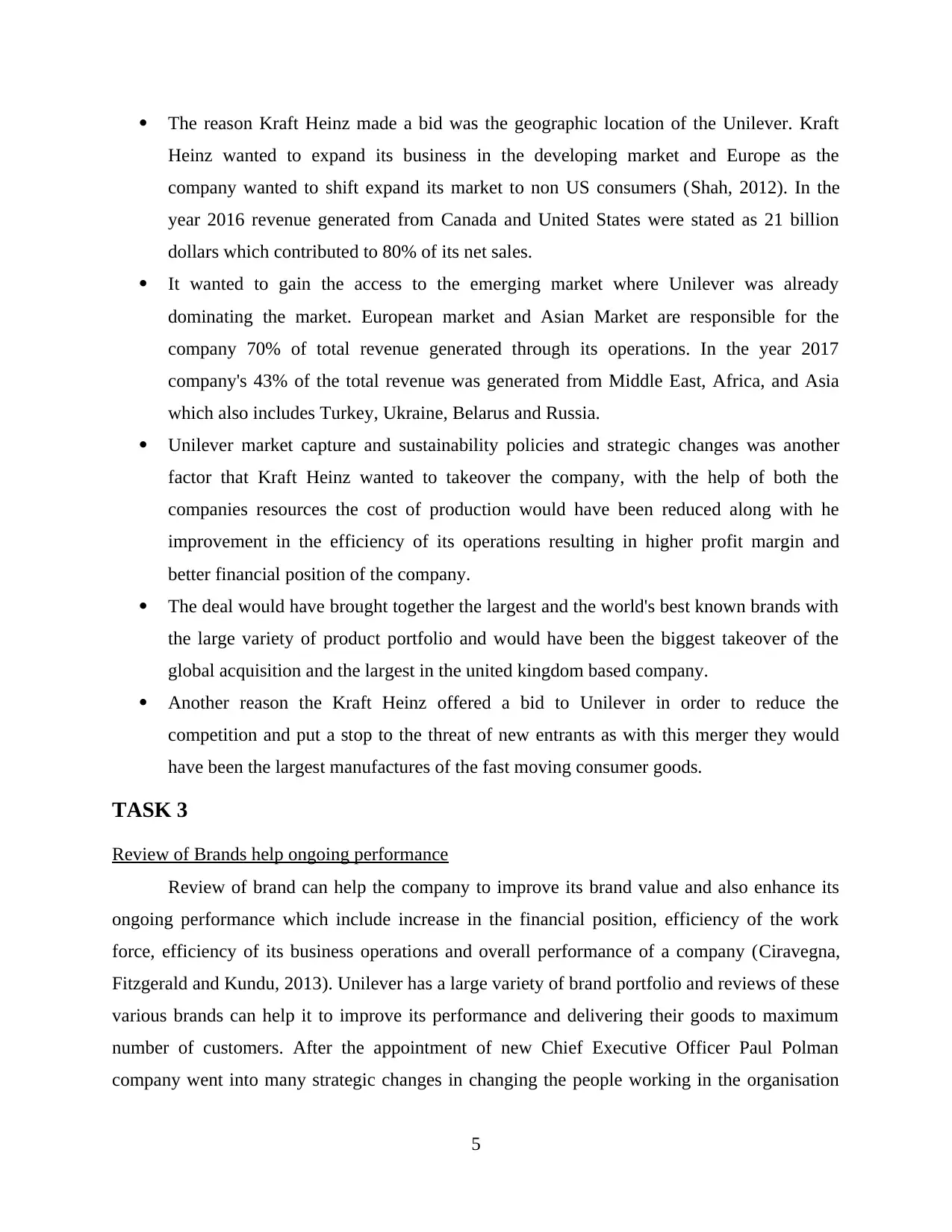
The reason Kraft Heinz made a bid was the geographic location of the Unilever. Kraft
Heinz wanted to expand its business in the developing market and Europe as the
company wanted to shift expand its market to non US consumers (Shah, 2012). In the
year 2016 revenue generated from Canada and United States were stated as 21 billion
dollars which contributed to 80% of its net sales.
It wanted to gain the access to the emerging market where Unilever was already
dominating the market. European market and Asian Market are responsible for the
company 70% of total revenue generated through its operations. In the year 2017
company's 43% of the total revenue was generated from Middle East, Africa, and Asia
which also includes Turkey, Ukraine, Belarus and Russia.
Unilever market capture and sustainability policies and strategic changes was another
factor that Kraft Heinz wanted to takeover the company, with the help of both the
companies resources the cost of production would have been reduced along with he
improvement in the efficiency of its operations resulting in higher profit margin and
better financial position of the company.
The deal would have brought together the largest and the world's best known brands with
the large variety of product portfolio and would have been the biggest takeover of the
global acquisition and the largest in the united kingdom based company.
Another reason the Kraft Heinz offered a bid to Unilever in order to reduce the
competition and put a stop to the threat of new entrants as with this merger they would
have been the largest manufactures of the fast moving consumer goods.
TASK 3
Review of Brands help ongoing performance
Review of brand can help the company to improve its brand value and also enhance its
ongoing performance which include increase in the financial position, efficiency of the work
force, efficiency of its business operations and overall performance of a company (Ciravegna,
Fitzgerald and Kundu, 2013). Unilever has a large variety of brand portfolio and reviews of these
various brands can help it to improve its performance and delivering their goods to maximum
number of customers. After the appointment of new Chief Executive Officer Paul Polman
company went into many strategic changes in changing the people working in the organisation
5
Heinz wanted to expand its business in the developing market and Europe as the
company wanted to shift expand its market to non US consumers (Shah, 2012). In the
year 2016 revenue generated from Canada and United States were stated as 21 billion
dollars which contributed to 80% of its net sales.
It wanted to gain the access to the emerging market where Unilever was already
dominating the market. European market and Asian Market are responsible for the
company 70% of total revenue generated through its operations. In the year 2017
company's 43% of the total revenue was generated from Middle East, Africa, and Asia
which also includes Turkey, Ukraine, Belarus and Russia.
Unilever market capture and sustainability policies and strategic changes was another
factor that Kraft Heinz wanted to takeover the company, with the help of both the
companies resources the cost of production would have been reduced along with he
improvement in the efficiency of its operations resulting in higher profit margin and
better financial position of the company.
The deal would have brought together the largest and the world's best known brands with
the large variety of product portfolio and would have been the biggest takeover of the
global acquisition and the largest in the united kingdom based company.
Another reason the Kraft Heinz offered a bid to Unilever in order to reduce the
competition and put a stop to the threat of new entrants as with this merger they would
have been the largest manufactures of the fast moving consumer goods.
TASK 3
Review of Brands help ongoing performance
Review of brand can help the company to improve its brand value and also enhance its
ongoing performance which include increase in the financial position, efficiency of the work
force, efficiency of its business operations and overall performance of a company (Ciravegna,
Fitzgerald and Kundu, 2013). Unilever has a large variety of brand portfolio and reviews of these
various brands can help it to improve its performance and delivering their goods to maximum
number of customers. After the appointment of new Chief Executive Officer Paul Polman
company went into many strategic changes in changing the people working in the organisation
5
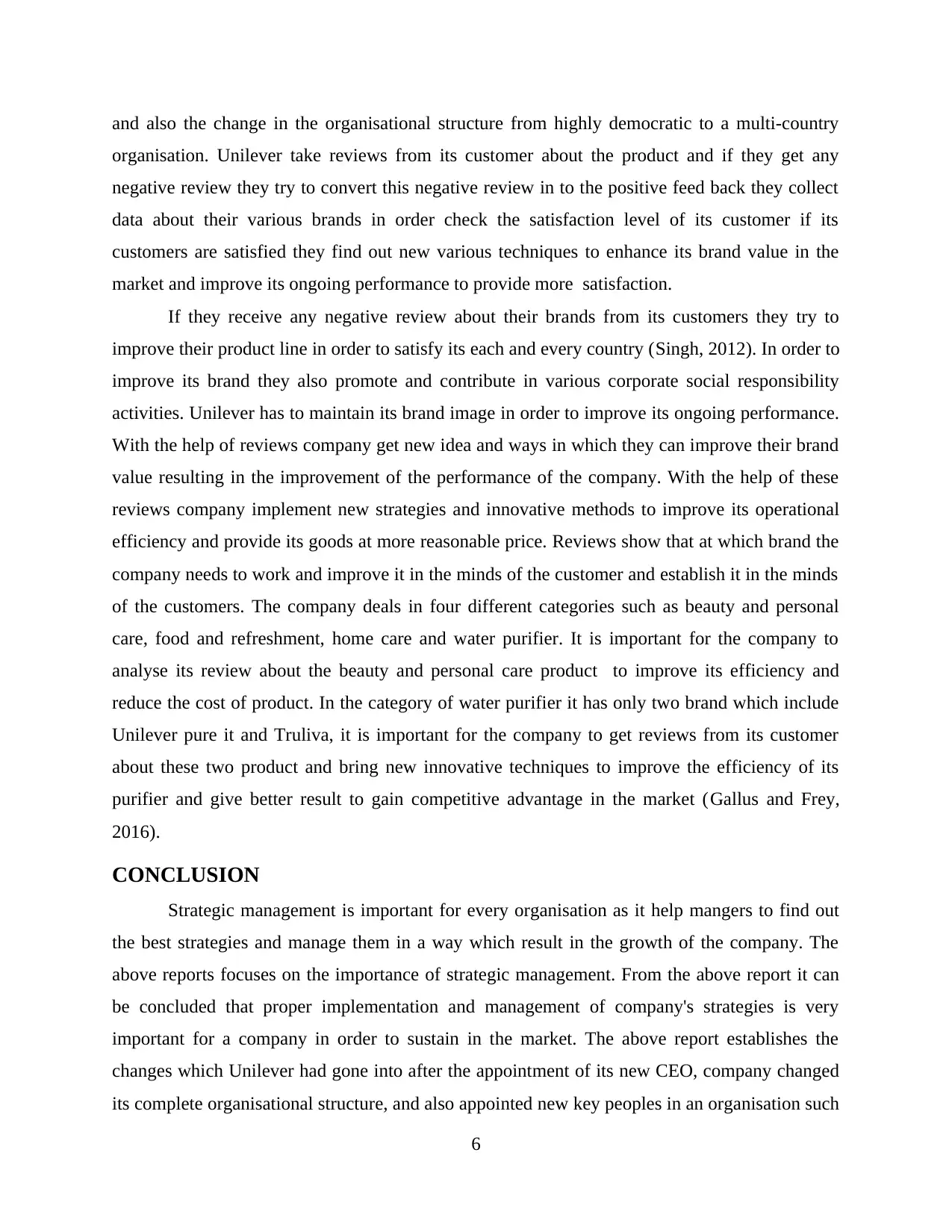
and also the change in the organisational structure from highly democratic to a multi-country
organisation. Unilever take reviews from its customer about the product and if they get any
negative review they try to convert this negative review in to the positive feed back they collect
data about their various brands in order check the satisfaction level of its customer if its
customers are satisfied they find out new various techniques to enhance its brand value in the
market and improve its ongoing performance to provide more satisfaction.
If they receive any negative review about their brands from its customers they try to
improve their product line in order to satisfy its each and every country (Singh, 2012). In order to
improve its brand they also promote and contribute in various corporate social responsibility
activities. Unilever has to maintain its brand image in order to improve its ongoing performance.
With the help of reviews company get new idea and ways in which they can improve their brand
value resulting in the improvement of the performance of the company. With the help of these
reviews company implement new strategies and innovative methods to improve its operational
efficiency and provide its goods at more reasonable price. Reviews show that at which brand the
company needs to work and improve it in the minds of the customer and establish it in the minds
of the customers. The company deals in four different categories such as beauty and personal
care, food and refreshment, home care and water purifier. It is important for the company to
analyse its review about the beauty and personal care product to improve its efficiency and
reduce the cost of product. In the category of water purifier it has only two brand which include
Unilever pure it and Truliva, it is important for the company to get reviews from its customer
about these two product and bring new innovative techniques to improve the efficiency of its
purifier and give better result to gain competitive advantage in the market (Gallus and Frey,
2016).
CONCLUSION
Strategic management is important for every organisation as it help mangers to find out
the best strategies and manage them in a way which result in the growth of the company. The
above reports focuses on the importance of strategic management. From the above report it can
be concluded that proper implementation and management of company's strategies is very
important for a company in order to sustain in the market. The above report establishes the
changes which Unilever had gone into after the appointment of its new CEO, company changed
its complete organisational structure, and also appointed new key peoples in an organisation such
6
organisation. Unilever take reviews from its customer about the product and if they get any
negative review they try to convert this negative review in to the positive feed back they collect
data about their various brands in order check the satisfaction level of its customer if its
customers are satisfied they find out new various techniques to enhance its brand value in the
market and improve its ongoing performance to provide more satisfaction.
If they receive any negative review about their brands from its customers they try to
improve their product line in order to satisfy its each and every country (Singh, 2012). In order to
improve its brand they also promote and contribute in various corporate social responsibility
activities. Unilever has to maintain its brand image in order to improve its ongoing performance.
With the help of reviews company get new idea and ways in which they can improve their brand
value resulting in the improvement of the performance of the company. With the help of these
reviews company implement new strategies and innovative methods to improve its operational
efficiency and provide its goods at more reasonable price. Reviews show that at which brand the
company needs to work and improve it in the minds of the customer and establish it in the minds
of the customers. The company deals in four different categories such as beauty and personal
care, food and refreshment, home care and water purifier. It is important for the company to
analyse its review about the beauty and personal care product to improve its efficiency and
reduce the cost of product. In the category of water purifier it has only two brand which include
Unilever pure it and Truliva, it is important for the company to get reviews from its customer
about these two product and bring new innovative techniques to improve the efficiency of its
purifier and give better result to gain competitive advantage in the market (Gallus and Frey,
2016).
CONCLUSION
Strategic management is important for every organisation as it help mangers to find out
the best strategies and manage them in a way which result in the growth of the company. The
above reports focuses on the importance of strategic management. From the above report it can
be concluded that proper implementation and management of company's strategies is very
important for a company in order to sustain in the market. The above report establishes the
changes which Unilever had gone into after the appointment of its new CEO, company changed
its complete organisational structure, and also appointed new key peoples in an organisation such
6
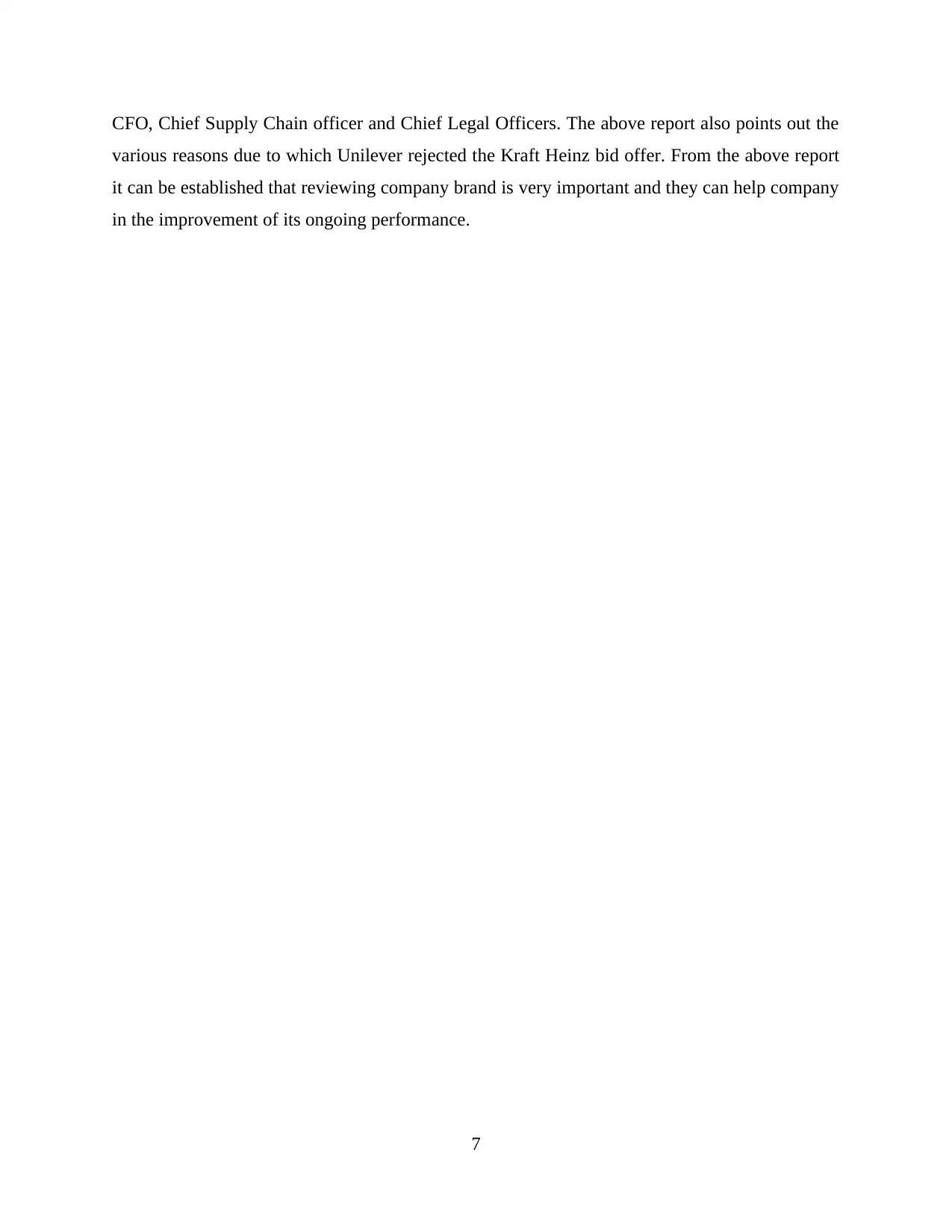
CFO, Chief Supply Chain officer and Chief Legal Officers. The above report also points out the
various reasons due to which Unilever rejected the Kraft Heinz bid offer. From the above report
it can be established that reviewing company brand is very important and they can help company
in the improvement of its ongoing performance.
7
various reasons due to which Unilever rejected the Kraft Heinz bid offer. From the above report
it can be established that reviewing company brand is very important and they can help company
in the improvement of its ongoing performance.
7
Secure Best Marks with AI Grader
Need help grading? Try our AI Grader for instant feedback on your assignments.
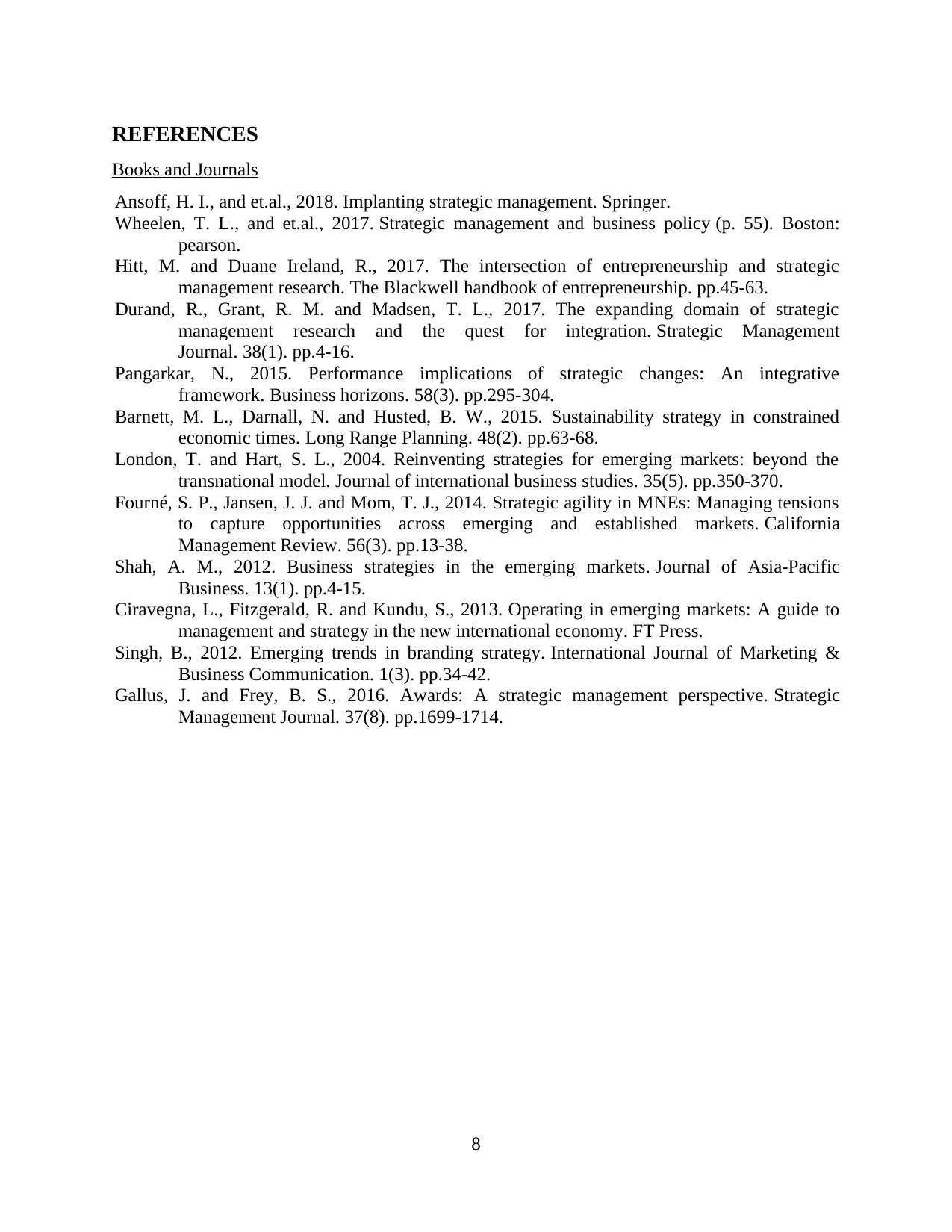
REFERENCES
Books and Journals
Ansoff, H. I., and et.al., 2018. Implanting strategic management. Springer.
Wheelen, T. L., and et.al., 2017. Strategic management and business policy (p. 55). Boston:
pearson.
Hitt, M. and Duane Ireland, R., 2017. The intersection of entrepreneurship and strategic
management research. The Blackwell handbook of entrepreneurship. pp.45-63.
Durand, R., Grant, R. M. and Madsen, T. L., 2017. The expanding domain of strategic
management research and the quest for integration. Strategic Management
Journal. 38(1). pp.4-16.
Pangarkar, N., 2015. Performance implications of strategic changes: An integrative
framework. Business horizons. 58(3). pp.295-304.
Barnett, M. L., Darnall, N. and Husted, B. W., 2015. Sustainability strategy in constrained
economic times. Long Range Planning. 48(2). pp.63-68.
London, T. and Hart, S. L., 2004. Reinventing strategies for emerging markets: beyond the
transnational model. Journal of international business studies. 35(5). pp.350-370.
Fourné, S. P., Jansen, J. J. and Mom, T. J., 2014. Strategic agility in MNEs: Managing tensions
to capture opportunities across emerging and established markets. California
Management Review. 56(3). pp.13-38.
Shah, A. M., 2012. Business strategies in the emerging markets. Journal of Asia-Pacific
Business. 13(1). pp.4-15.
Ciravegna, L., Fitzgerald, R. and Kundu, S., 2013. Operating in emerging markets: A guide to
management and strategy in the new international economy. FT Press.
Singh, B., 2012. Emerging trends in branding strategy. International Journal of Marketing &
Business Communication. 1(3). pp.34-42.
Gallus, J. and Frey, B. S., 2016. Awards: A strategic management perspective. Strategic
Management Journal. 37(8). pp.1699-1714.
8
Books and Journals
Ansoff, H. I., and et.al., 2018. Implanting strategic management. Springer.
Wheelen, T. L., and et.al., 2017. Strategic management and business policy (p. 55). Boston:
pearson.
Hitt, M. and Duane Ireland, R., 2017. The intersection of entrepreneurship and strategic
management research. The Blackwell handbook of entrepreneurship. pp.45-63.
Durand, R., Grant, R. M. and Madsen, T. L., 2017. The expanding domain of strategic
management research and the quest for integration. Strategic Management
Journal. 38(1). pp.4-16.
Pangarkar, N., 2015. Performance implications of strategic changes: An integrative
framework. Business horizons. 58(3). pp.295-304.
Barnett, M. L., Darnall, N. and Husted, B. W., 2015. Sustainability strategy in constrained
economic times. Long Range Planning. 48(2). pp.63-68.
London, T. and Hart, S. L., 2004. Reinventing strategies for emerging markets: beyond the
transnational model. Journal of international business studies. 35(5). pp.350-370.
Fourné, S. P., Jansen, J. J. and Mom, T. J., 2014. Strategic agility in MNEs: Managing tensions
to capture opportunities across emerging and established markets. California
Management Review. 56(3). pp.13-38.
Shah, A. M., 2012. Business strategies in the emerging markets. Journal of Asia-Pacific
Business. 13(1). pp.4-15.
Ciravegna, L., Fitzgerald, R. and Kundu, S., 2013. Operating in emerging markets: A guide to
management and strategy in the new international economy. FT Press.
Singh, B., 2012. Emerging trends in branding strategy. International Journal of Marketing &
Business Communication. 1(3). pp.34-42.
Gallus, J. and Frey, B. S., 2016. Awards: A strategic management perspective. Strategic
Management Journal. 37(8). pp.1699-1714.
8
1 out of 11
Related Documents
Your All-in-One AI-Powered Toolkit for Academic Success.
+13062052269
info@desklib.com
Available 24*7 on WhatsApp / Email
![[object Object]](/_next/static/media/star-bottom.7253800d.svg)
Unlock your academic potential
© 2024 | Zucol Services PVT LTD | All rights reserved.





